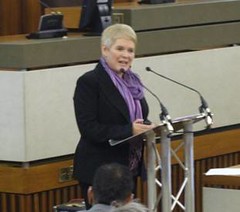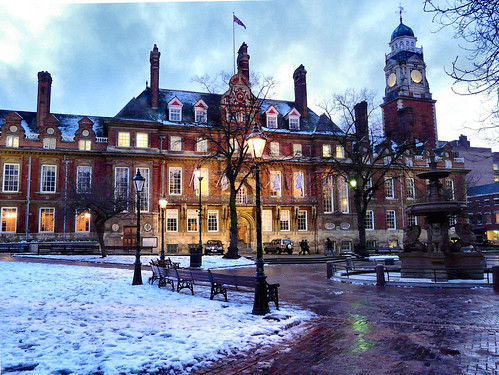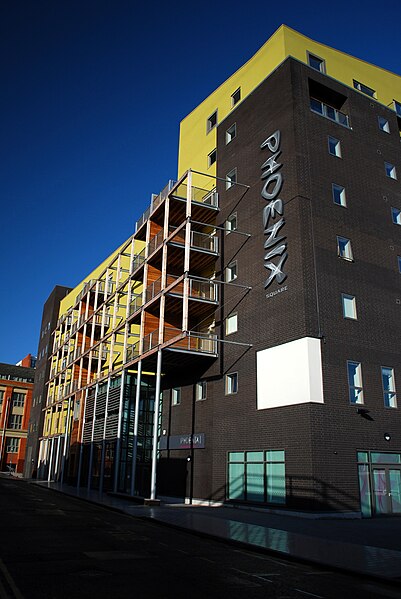
Off to see
The Road this evening at Phoenix Square. For the past week I've been cramming the audiobook on my iPod (all 6 hours 39 minutes, unabridged, read by Tom Stechschulte), so this story has loomed large in my mind recently. For those who haven't caught up with the book (by Cormac McCarthy) or the film, here's a brief review from the online publication, Racket Magazine:
"The Road follows the journey of a man and his son as they make their way across a stark wasteland after an unnamed global apocalypse as they are faced with constant dangers and emotionally difficult decisions as they try to survive. The film is more scary, tense, and horrifying than the trailers might make it out to be. The cataclysmic earthquakes, wildfires, and extinction of all plant and wildlife on earth are merely the backdrop to a much more sinister exploration of what people are capable of doing when desperate enough.
"With this film we are given the chance to observe people confronted with the decision to face a truly bleak and hopeless future and a daily existence filled with looming threats and unspeakable horrors, or to find a way to escape it by whatever means possible. Times like those test and shatter the way people view themselves. A hungry belly and no hope can change a man into something terrible. The film shows that some choose to still hold on with furious devotion and tenacity, clinging to their sense of humanity and anything to focus hope on even as those very things threaten and complicate their survival. What is interesting is that the movie goes beyond being about a fight for survival and asks what makes people choose to live."
I think that this film raises some specially interesting questions for people of a religious and/or spiritual inlination, even if it appears to be thoroughly secular in nature. Cormac McCarthy is a brilliant author (commonly referred to these days as "America's greatest living writer"). In his writing, we're brought face-to-face with some of the essential questions of existence. In
No Country for Old Men we encounter a character who may be the embodiment of evil, an avenging demon or fallen angel. McCarthy doesn't tell us whether this is so; we are left to decide.
The Road asks even more central and unsettling questions, not about others but about ourselves. What are we when we're stripped down to nothing? Is "civilization" just a thin veneer covering our natural state of barbarism? Do we have any chance of survival as individuals or as a species if we can't allow otehrs into our lives? Is trust naive or essential? If there were no animals in the world, do we become animals? If nature itself is dying, can we survive? What would the world be without us?

At the heart of this story is what's become recognised as one of the most touching, profound and moving portrayals of a father and son. That relationship is an archetype for personal dynamics throughout history and across culutures of course - but especially so in religious narratives, whether allegorical, mythological or historical. I'm not going to lay out a list of father/son stories from the various faith traditions, just because there are so many of them that I'd inevitably end up leaving some out. I would just ask, faithful reader, that you consider your own belief system - whether it's one in which you've been brought up (and maybe abandoned) or one within which you live now. Such a religious dimension is shown in the story, for example, at one moment when we are told that the father, "knew only that the child was his warrant. He said: If he is not the word of God God never spoke."
In today's world, universal catastrophe can seem unexpectedly and depressingly close - either by our own hand, or because the planet itself will heave us off its body.
The Road brings us face-to-face with our worst nightmare, collectively and individually. In the context of such destruction and despair, it says some important things about what it means to be human. It has some of the most frightening and appalling images that I've ever encountered (though the worst of these doesn't appear in the film); but it also has incrdeibly stirring and tender things to say about love, compassion, sympathy and generosity. It certainly says that if we are to be saved or redeemed in this world, it can't be through material means.
I can see how this fits inside the kind of metanarrative set up by Judeao-Christian beliefs, Baha'i too; Clare thinks it would fit in with a genrally Jain worldview - Buddhist too, by pretty much the same criteria. Would this look like the Kali Yuga - the Dark Age - that is taught in Hindu theology? I'd like to know how viewers or readers from differing belief systems would respond to this story. Do all faiths possess some kind of apocalyptic narrative, fear or expectation? Or might
The Road be seen as a story peculiar to the west, something born of - and speaking to - a society that has lost touch with God? In a bigger, universal sense, is that what
The Road is? An extended metaphor for a world without God, the darkness that descends on us, the transformation that comes over us when we are left to ourselves? I'm not saying it is or it isn't, I'm just asking ...
The Road rejects the cliches associated with this sort of fiction. There's no safe refuge at the end of the road (no end to the road itself, even) - no Oz, no Zion, no walled city, not even a ship at sea like at the end of
Children of Men. The man doesn't encounter a woman on the way to offer releif or comfort or even doomed romance. The only hope comes with a rag-tag family - who many not even be realted to each other for all we know. But somehow at the very end of the tale, when we're left in no doubt that there's no way of putting the world back togetehr, that there is no hope, then the boy (who was born after the unidentified catastrophe so has never known a different world) turns to faith. Not in God, that's for sure (though the film and the book differ a little on this point). He doesn't know if the people with whom he falls in are good guys or bad guys - he just has to "take a shot". Some have said that's a cop-out ending: but what do they want? To see everyone dead on the page or on the screen? In this world, even the soil appears to be dying, so all they need to do is draw a straight line in their own head and they'll get there. Put
The Road up against
The Age of Stupid (or, Lord preserve us,
2012 - which also depends on its own father/son dynamic) and see which one has most to tell us about the end of the world.
McCarthy isn't in the business of offering tidy explanations for the mystery and unpredictability of human behaviour - the inner life of his characters may well be at odds with the evidence of the world around them, but that's what people do. Yes it's bleak, no one can deny that - but many would argue that it's anything but depressing. The book (at least) is a genuine work of art, perhaps a great one. In response to those who say it's depressing, I think it's anything but. I find it intensely spiritual, almost overwhelmingly so. It not only ask us to consider what it means to be human, but also what it takes to
stay human. I think
The Road is beautiful and stirring.
Coincidentally, the unnamed father and son in the story keep reassuring each other that they will survive because they are "carrying the fire"; that's the title of another book I'm reading just now, the autobiography of Michael Collins, command module pilot on Apollo 11 - the one who didn't get to set foot on the moon. On a certain level, one of the great ironies of my lifetime is that the same kind of thinking that led to the great scientific and technological achievements of the Space Age may well have contributed to the parlous state of the world today - and a perilous future for all of us.
Read an interview with actor Tom Stechschulte, who reads the audiobook version of
The Road:
http://www.craigmcdonaldbooks.com/audio-hector.php



















